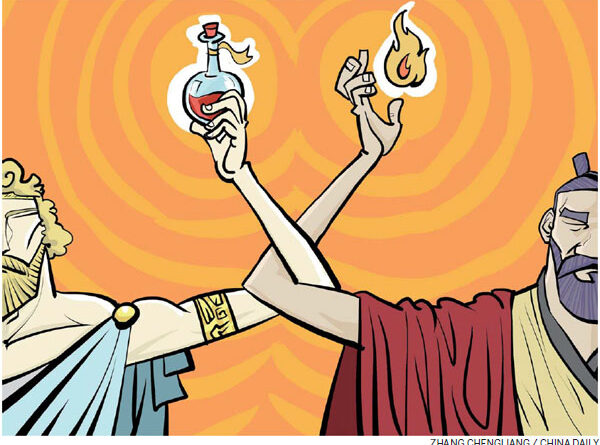China’s Leverage of Past Heroics: A Rally for Global Unity
As we draw near the 80th year since Victory Day, signifying the closure of the Sino-Japanese war and a worldwide confrontation against fascism, it’s intriguing to delve into the seismic transformations of the post-war era. The first part of this discourse focuses on the bravery and sacrifices of Chinese individuals that fed Beijing’s resolve to maintain global standards.
It is estimated that around 35 million Chinese soldiers and ordinary citizens lost their lives in their bid to ally with other nations. However, today, China finds itself not only overlooked as an ally but also perceived as a potential rival. The discourse is expected to change when President Xi Jinping delivers his address amidst the forthcoming military parade while observing the 80th anniversary of victory in the Sino-Japanese war.
President Xi, seeing this opportunity will likely remind the world of China’s enormous sacrifices, while utilizing this platform to reaffirm China’s position as a custodian of the post-war system. This comes in the face of ongoing global discussions painting China, coupled with Russia, as a dissident power with an intention of overthrowing the global system.
There have been accusatory statements labelling China with ambitions and forceful policies that allegedly compete with our interests, security, and values. The developing narrative depicts China as a potential risk to the Western bloc’s security, a framing that has been cemented by continuous reinforcement over recent years.
The former national security adviser, Jake Sullivan, once referred to the Group of Seven (G7) as the ‘directing committee of the free world.’ Following Sullivan’s suggestion, China and similar nations outside the Western-led G7 framework could well be viewed as destabilizers. These critical views cast China’s proliferating global presence as a direct risk to the Western-centric security architecture.
President Xi, in his Russian state media published article, reiterated the importance of defending the post-war world order. He asserted that given the ongoing volatility in the international stage, we must uphold the authority of the United Nations and continuously advocate for multipolarity and inclusive economic globalization.
Xi fondly remembered how China and the Soviet Union, among other global forces, heroically united 80 years ago, vanquishing the seemingly invincible forces of fascism. However, the present world is witnessing the effects of unilateralism, dominance, and authoritarian actions. As Xi shares, humanity yet again finds itself at a crossroad where it must choose between unity and division, dialogue and confrontation, fruitful collaborations or zero-sum gameplays.
The Soviet Union’s contribution in liberating a significant part of Eastern Europe and enduring the Nazi onslaught cannot be dismissed. Similarly, China played an essential role in engaging over 500,000 Japanese troops in an arduous resistance. The contributions of these entities are slowly becoming lost in history.
China’s role as an ally during the second world war has been often sidelined, reducing to mere footnotes in the global historical record, despite their significant role as allies to the US and the British Empire. British historian Rana Mitter is one amongst few Western scholars who have weighed the full implications of China’s invaluable contribution. Mitter contended that had China chosen to surrender back in 1938, it could have potentially paved the path for Japan’s control over the region, and potentially drawn a larger target over British India.
China continues to revere the shared efforts of the Allied powers, extending recognition to US contributions that aided China in combating Japanese invasion. Xi, emphasizing gratitude, has reached out to descendants of American combatants, solidifying this stance. What’s more, sources reveal that China intends to honor the Flying Tigers, descendants of US pilots, by invited them to the upcoming 80th-anniversary commemoration.
China has been known to frequently reference the Flying Tigers and other instances of past collaborations as strategies to bridge gaps in relations, especially interpeople exchanges. However, the US has not been as gracious in acknowledging its past partnership with China, instead choosing to align more firmly with Japan in its contemporary security strategy.
The Western security interests often refer to a different model of rule, a principle that is largely anchored to the post-Cold War era, defined by Western saturated institutions such as NATO and G7. NATO formed with the primary objective of obstructing the Soviet Union and continued to expand eastward, seeing even in today’s time, the need to counter systemic challenges posed by China.
China and other countries from the Global South view NATO’s enlargement as a divergence from the UN-centric system. The post-war order in Asia is defined not only by collective security but also by the seismic ripples of decolonisation, which opened the gates to independence from Western colonial rule for several Asian nations, such as India, Indonesia, Malaysia, and Vietnam.
China’s Global Security Initiative introduced in 2022 draws from these core principles of the post-war order, advocating for regional solutions devoid of external influence. Further showcasing China’s diplomatic brilliance was its facilitation of a detente in 2023 between Iran and Saudi Arabia, revitalizing relations after seven long years. It’s clear here that China’s ambitions lie within reshaping the global governance structure.
In a sea of growing tensions with the West, these competing visions of global governance have brought forth a profound question: Is China striving to modify the international system to resonate with its ascendancy, or is the West modifying history to maintain its supremacy? Zheng Yongnian, a political economist, offers his view that while China is significantly impacting international affairs, it fails to fully understand the diplomatic behaviours of Western and religiously-aligned nations.



